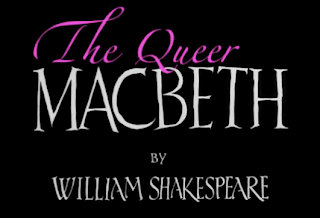William Shakespeare
Directed and choreographed by Simon Jay
★★
Pros: Delightful dance numbers, the gender swapping makes for a radical retelling of a classic, all proceeds to Terrence Higgins Trust.
Cons: Some shaky performances and, I thought, a flawed premise.
Our Verdict: Queer Macbeth has its heart in the right place and its proceeds go to a good cause. Unfortunately, uneven acting and the inherent problems involved in injecting comedy into a dark tragedy created a muddled production.
 |
| Courtesy of Stagepunk Theatre |
The Black Cap, a gay pub in Camden, with its glittery stage backdrop and red velvet curtain, is an unexpected setting for the dark and terrifying Macbeth. Indeed, Stagepunk Theatre presents the Scottish play as you’ve never seen it before: almost all of the characters have been gender flipped, and the production incorporates musical numbers lip sung to Lady Gaga and Madonna, among others. Furthermore, the whole play has been abridged to a mere 70 minutes, partly achieved by combining the characters of Macduff and Malcolm. The production shows influences of pantomime, with Lady Macbeth and Lady Malcolm played like Dames, characters regularly breaking the fourth wall, and the use of pop music. The original lines from Shakespeare, however, have been left intact. Entry to the play is by donation and all proceeds go to Terrence Higgins Trust, an HIV and sexual health charity.
I fear this production’s premise may have been flawed from the start. The inherent tragedy of Shakespeare’s original play struggles to wear the comic interpretation that Stagepunk are imposing. The production jolts between moments of broad comedy and moments of intense seriousness, where the dark tragedy that Shakespeare intended suddenly hijacks the production. The result is a muddled and confusing vision. To create the wacky comic version of Macbeth that, Stagepunk intended would, in my opinion, require a brand new script.
I think that the way the gender flipping was executed contributed to the play’s unevenness. Let me first say that, in principle I’m all for gender blind casting. The conceit is surely an exciting challenge for both actors and actresses, enables women to take on meaty and complex roles formerly reserved for men, and allows the audience to see familiar material in a fresh way. However, I felt that in this production, the gender flipping applied a double standard. As I mentioned, Lady Macbeth and Lady Malcolm (Simon Jay and Arron Ferguson, respectively) were played for laughs. Indeed, Simon Jay, who also directed the play, is a scene stealer as Lady Macbeth. Yet the women, on the whole, played the traditionally male roles with dramatic seriousness. For example, Malcom (Kate Maxwell) weeping at the death of his wife and child felt very real, but utterly out of place in the zany production. I found myself wondering, why is it that men moving into traditionally-female territory is inherently comic, but women moving into traditionally-male territory is so often an opportunity for gravitas? There is a larger sociological pattern here that has nothing to do with Stagepunk.
Queer Macbeth did feature some clever staging ideas. I found the portrayal of the three witches (Matt Reynolds, Arron Ferguson and João Batista de Figueiredo) as sputtering and vaguely epileptic both original and freaky. For the appearance of Banquo’s ghost, the actress (Caitlin Evans) held an iPad in front of her face, which displayed wonderful and disturbing original animations by Paul Harrison. And although I found the musical numbers an odd fit, the choreography is excellent and the cast are, without exception, excellent dancers. But I wish the actors had concentrated more on the basics, their words and characterizations, as their performances were often shaky. The actress playing Macbeth (Sam Shaw) was overcome with a fit of giggles. Lady Macbeth seized the opportunity to garner the biggest laugh of the evening when he ad-libbed (and I’m paraphrasing) ‘My Lord, you’re ill. You keep having these laughing fits’.
Queer Macbeth is for a good cause, but I fear that, despite how radical it is, this production is still afflicted with the Scottish play’s legendary curse.
Please feel free to leave your thoughts and opinions in the comments section below!
Queer Macbeth has finished its run at Black Cap theatre. For more information on on Stagepunk Theatre visit http://stagepunk.tumblr.com/ and for more information on Terrence Higgins Trust visit http://www.tht.org.uk/.
 Everything Theatre Reviews, interviews and news for theatre lovers, London and beyond
Everything Theatre Reviews, interviews and news for theatre lovers, London and beyond


